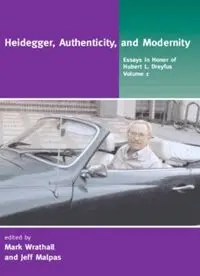Table Of ContentWrathall covers 5/3/01 1:26 PM Page 1
Heidegger, Authenticity, and Modernity
Essays in Honor of Hubert L. Dreyfus, Volume 1 Heidegger, Authenticity, and Modernity
edited by Mark Wrathall and Jeff Malpas
For more than a quarter of a century, Hubert L. Dreyfus has been the Essays in Honor of
leading voice in American philosophy for the continuing relevance of phe- Hubert L. Dreyfus
nomenology, particularly as developed by Edmund Husserl, Martin
Heidegger, and Maurice Merleau-Ponty. Dreyfus has influenced a genera- Volume 1
tion of students and a wide range of colleagues, and these volumes are an
excellent representation of the extent and depth of that influence.
In keeping with Dreyfus’s openness to others’ ideas, many of the essays in
this volume take the form of arguments with various of his positions. The
essays focus on the dialogue with the continental philosophical tradition,
in particular the work of Heidegger, that has played a foundational role in
Dreyfus’s thinking. The sections are Philosophy and Authenticity;
Modernity, Self, and the World; and Heideggerian Encounters. The book
concludes with Dreyfus’s responses to the essays.
Mark Wrathall is Assistant Professor in the Department of Philosophy at
Brigham Young University. Jeff Malpas is Professor of Philosophy and
Head of School at the University of Tasmania, Australia.
Books by Hubert L. Dreyfus of related interest
Being-in-the-World
A Commentary on Heidegger’s Being and Time, Division I
Available in paperback
What Computers Still Can’t Do
Available in paperback
The MIT Press
Massachusetts Institute of Technology
Cambridge, Massachusetts 02142 edited by
http://mitpress.mit.edu
Mark Wrathall
WRAAP1 ,!7IA2G2-hdbcha!:t;K;k;K;k
0-262-73127-4 and Jeff Malpas
Heidegger, Authenticity, and Modernity Wrathall and Malpas, editors
Heidegger, Authenticity, and Modernity
Heidegger, Authenticity, and Modernity
Essays in Honor of Hubert L. Dreyfus, Volume 1
edited by Mark A. Wrathall and Jeff Malpas
The MIT Press
Cambridge, Massachusetts
London, England
©2000 Massachusetts Institute of Technology
All rights reserved. No part of this book may be reproduced in any form or by any
electronic or mechanical means (including photocopying, recording, or information
storage and retrieval) without permission in writing from the publisher.
This book was set in New Baskerville by Best-set Typesetter Ltd., Hong Kong, and
printed and bound in the United States of America
Library of Congress Cataloging-in-Publication Data
Heidegger, authenticity, and modernity : essays in honor of Hubert L. Dreyfus / edited by
Mark A. Wrathall and Jeff Malpas.
p. cm.
Includes bibliographical references and index.
ISBN 0-262-23207-3 (v. 1 : alk. paper)—ISBN 0-262-73127-4 (v. 1 : pbk. : alk. paper)
—ISBN 0-262-23208-1 (v. 2 : alk. paper)—ISBN 0-262-73128-2 (v. 2 : pbk. : alk. paper)
1. Dreyfus, Hubert L. 2. Heidegger, Martin, 1889–1976—Influence.
3. Philosophy, European. 4. Philosophy, American—20th century. 5. Computers.
6. Cognitive science. 7. Dreyfus, Hubert L.—Influence. I. Dreyfus, Hubert L.
II. Wrathall, Mark A. III. Malpas, J. E.
B945.D764 H45 2000
193—dc21 99-056942
Contents
Foreword ix
Richard Rorty
Acknowledgments xv
Introduction 1
Mark A. Wrathall and Jeff Malpas
I Philosophy and Authenticity 11
1 Must We Be Inauthentic? 13
Taylor Carman
2 The Significance of Authenticity 29
Randall Havas
3 Truth and Finitude: Heidegger’s Transcendental
Existentialism 43
John Haugeland
4 Philosophy and Authenticity: Heidegger’s Search for
a Ground for Philosophizing 79
Charles Guignon
II Modernity, Self, and World 103
5 Kierkegaard’s Present Age and Ours 105
Alastair Hannay
vi
Contents
6 The End of Authentic Selfhood in the
Postmodern Age? 123
Michael E. Zimmerman
7 “The End of Metaphysics” and “A New Beginning” 149
Michel Haar
8 Nietzsche and the “Masters of Truth”:
The Pre-Socratics and Christ 165
Béatrice Han
9 What Is Dwelling? The Homelessness of Modernity
and the Worlding of the World 187
Julian Young
10 Uncovering the Space of Disclosedness:
Heidegger, Technology, and the Problem of Spatiality
in Being and Time 205
Jeff Malpas
III Heideggerian Encounters 229
11 The Primacy of Practice and Assertoric Truth:
Dewey and Heidegger 231
William D. Blattner
12 Absorbed Coping, Husserl and Heidegger 251
Dagfinn Føllesdal
13 Proofs and Presuppositions: Heidegger, Searle, and
the “Reality” of the “External” World 259
David R. Cerbone
14 Intending the Intender (Or, Why Heidegger
Isn’t Davidson) 279
Mark Okrent
IV Responses 303
15 Responses 305
Hubert L. Dreyfus
vii
Contents
Notes 343
References 385
Contributors 397
Index 399
Foreword
Richard Rorty
No one in our day has done more than Hubert L. Dreyfus to make
American philosophy less parochial. For some forty years, he has
helped the rest of us understand what our European colleagues are
up to, introduced us to them, and encouraged the study of their
works. By commenting on them, by organizing conferences about
them, and most of all by weaving their works together with work
being done by anglophone analytic philosophers, Dreyfus has ren-
dered invaluable service to the international philosophical commu-
nity. It is no exaggeration to say that without Dreyfus the gap between
European and anglophone philosophy would be, at the end of the
twentieth century, far greater than it in fact is. By behaving as if the
analytic-Continental split were of no great importance, he has done
a great deal to narrow it.
My own acquaintance with European philosophy owes almost
everything to Dreyfus. Back in the late 1950s, when I was at Welles-
ley and Dreyfus was at Harvard, he encouraged me to read Merleau-
Ponty and tried to convince me that Husserl was not nearly as
pointless as I thought. Had I not been intrigued by his account of
Husserl’s break with Descartes, I should never have taught Cartesian
1
Meditations. By helping John Wild and others translate the early por-
2
tions of Sein und Zeit and letting me reproduce copies of the result,
Dreyfus made it possible for me to assign bits of that book to my
Wellesley classes. (This underground, unauthorized, mimeographed
translation was the basis for most teaching of Heidegger in the

